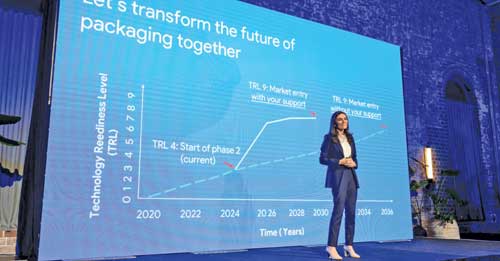ABOVE: Dr Nasim Amiralian, Group Leader of the Bio-Inspired Materials Group at the University of Queensland.
Amid escalating challenges on how to reduce global plastic pollution, a bio-packaging technology derived from agricultural waste is poised to revolutionise the industry by providing a sustainable, compostable and recyclable alternative to conventional plastic.
This world-leading technology has been developed at the University of Queensland by Bio-Inspired Materials Group leader Dr Nasim Amiralian and her team.
Annually, the world generates 300 million tonnes of plastic, with 85 percent of packaging stemming from fossil fuels, highlighting the urgent need for sustainable alternatives.
“We are tackling the dual crises of plastic packaging waste and agricultural food waste, which collectively amount to 1.4 billion tonnes annually,” Dr Amiralian said.
“We have created materials from sugarcane trash that can replace plastic packaging and extend the shelf life of produce thanks to its antimicrobial properties.
“These packaging solutions are optimised for mechanical strength, heat and moisture resistance, ensuring prolonged shelf life for packaged foods.
“Our 100 percent bio-based biodegradable packaging technology represents a significant leap forward in productivity and environmental sustainability.”
Their innovative approach focuses on developing bio-packaging from agricultural waste that is both compostable and recyclable and can be used to replace conventional items such as berry punnets commonly found in supermarkets.
This technology could be the key to reducing Australia’s re-ranking as the second highest generator of single-use plastic waste per capita globally.

Dr Amiralian presenting her work at the recent AgriFutures Australia and growAg Catalyst Pitch event in Sydney.
“Key benefits of this technology include substantial reductions in waste and emissions, elimination of harmful chemicals through recyclable green solvents, enhanced biodegradability and prevention of microplastic generation,” Dr Amiralian said.
“These attributes position the packaging materials as ideal solutions for both earthy and marine environments, aligning with global environmental goals.”
The global fibre packaging market, expected to surpass $537 billion by 2033, underscores the growing demand for sustainable alternatives.
This new fibre-based packaging technology not only reduces reliance on fossil fuels but also utilises agricultural waste, thereby reducing landfill and greenhouse gas emissions.
Dr Amiralian showcased her work as one of seven innovators at the recent AgriFutures Australia and growAG Catalyst Pitch event in Sydney, where she detailed this opportunity for investors passionate about sustainability, net-zero and zero-waste initiatives.
“Moving forward, we’re seeking support from industry partners, corporates, governments or investors to advance our technology for scaling up in standard production facilities,” Dr Amiralian said.
The Catalyst Program supports women in agrifood technology and innovation across Australia and New Zealand, identifying exceptional research and technology innovations ready for commercialisation and further development.
In addition to her groundbreaking work in bio-packaging, Dr Amiralian is dedicated to advancing opportunities for women and youth in science, technology, engineering and mathematics.
Her recent involvement in the University of Queensland’s Career Progression for Women program and her role in inspiring youth through the Queensland Chief Scientist case studies highlight her commitment to gender equality and educational advancement in STEM fields.
Click here for more information about the research or investment.







